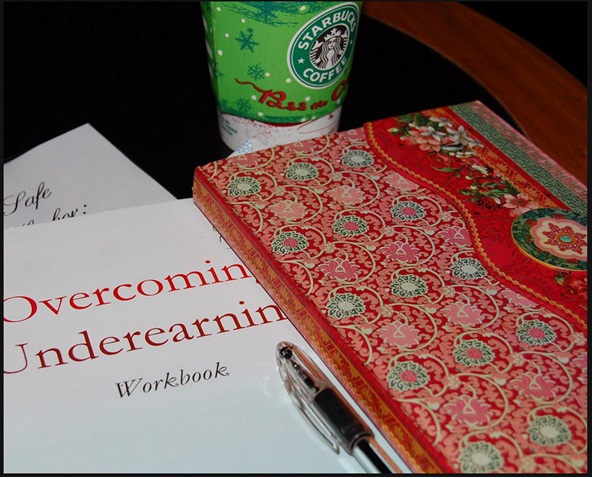 Ah, yes. Many of us seek it. Need it. Crave it. Demand it of ourselves and others. Ah, yes. Many of us seek it. Need it. Crave it. Demand it of ourselves and others.
Perfection.
Not to mention that it is ever-changing and strictly in the eye of the beholder, it can seem like a reasonable if not appropriate thing to reach for.
So what could be wrong with seeking perfection?
Especially for those whose parents, teachers, mentors and others encouraged, expected or required it.
Well-meaning that some of those instructors may have been, what they failed to realize is that the quest for perfection can also lead to a tortured life.
Chronic disappoinment.
Unease.
A sense of constant failure due to impossibly high standards that neither we nor others can reach.
Those are just some of the possible results of living a life in pursuit of perfection.
Human behavior researcher and author, Dr. Brene Brown, urges us to take a break. Her newest book, The Gifts of Imperfection, “urges us to expose and expel our insecurities in order to have the most fulfilling life possible.”
In other words, not only live with them but embrace our imperfections.
Seek the lessons they teach us instead of trying to kill them off.
Release the stress of overdoing and overworking that results from the quest for perfection.
After all, when we grasp the fact that our human journey is really about learning and experiencing rather than condeming ourselves to repetitive, unsuccessful attempts at clearing the bar of perfection, we can actually start to expand our horizons. Freely learn new things. Experience renewal. Even – once again – be silly, childlike and have some real fun.
How about that?
Sounds perfectly delicious to me.
 No Comments »
No Comments »

Whether tongue-in-cheek or not, Mark Twain knew a thing or two about how many of us think when he said, “I’ve lived through some terrible things in my life, some of which actually happened.”
The truth is we all too often expect, anticipate or down right insist on living in worst case scenarios.
There are, of course, myriad rationales for this.
Some people are flat out addicted to scaring themselves.
Without looking back to the needless worry they’ve put themselves through, others believe expecting the worst is a hedge against disappointment. Or that there’s some degree of controlling the situation in this way of thinking.
Still more are convinced that it’s more reasonable, even safer to expect and prepare for the worst.
But, unless we’re talking about hurricane season where there is some real benefit to being prepared, we are robbing ourselves of positive anticipation, optimism, freedom from worry and serenity.
Even more importantly, when we expect things to not work out, chances of this happening are beyond magnified.
We can almost ensure a bad outcome by expecting it.
Conversely, we incrementally improve the chances of a positive, excellent result by expecting and preparing for just that.
There is absolutely no harm in expecting the good. The better. The best.
None.
So – to quote you know who – JUST DO IT.
 No Comments »
No Comments »

“When the power of love overcomes the love of power, the world will know peace.”
No one seems certain who penned this quote but one thing is clear – whoever it was spoke a profound truth.
And expressed a beautiful, most welcome sentiment.
Sad that my first reaction is – don’t hold your breath.
With a world increasingly mired in war, hate and discord, it’s hard to imagine love flowing in or peace ever arriving.
Which – for those of us who care about such things – makes our job of promoting harmony a lot more urgent.
Simply put, we will be overrun by mounting ugliness if we don’t set our minds every day to blowing kisses of love to our world.
To passionately sending out messages of peace.
Or dedicating some small portion of each day to gentle, spiritual thinking, prose and pose.
If all that happens is our gaining some moments of deep satisfaction and safety, our exercise of sending out love will have enormous benefit.
If not for the world at large – then for us.
 1 Comment »
1 Comment »
 Learning to enjoy our lives is one of the greatest challenges we face as adults. And, it is also the single most important thing we can accomplish. Yet, many of us continue to struggle through life without feeling well-balanced and joyful. Ergo another round of self-help books that promise us the life we want, the one that we will REALLY love. Amazingly, many of us overlook the simple, natural act that contributes enormously to fulfilling the promise of a happy, healthy life: laughter. Learning to enjoy our lives is one of the greatest challenges we face as adults. And, it is also the single most important thing we can accomplish. Yet, many of us continue to struggle through life without feeling well-balanced and joyful. Ergo another round of self-help books that promise us the life we want, the one that we will REALLY love. Amazingly, many of us overlook the simple, natural act that contributes enormously to fulfilling the promise of a happy, healthy life: laughter.
There are countless ways and many rewards to regularly adding laughter to our lives. Here are but a few:
Laughter’s Contributions to a Healthy, Youthful Body.
Laughter is health-giving and stress-reducing. “It strengthens the body as it pumps the heart and muscles of the abdomen, chest, shoulders, and neck,” says William F. Fry, M.D., a Professor of Psychiatry at Stanford University Medical School. Laughter also stimulates the brain, ventilates the lungs, works as a healing agent for the body’s stress hormones, releases tension in the diaphragm and relieves pressure on the liver and other internal organs. Medical experts have determined that laughter boosts the immune system by increasing natural disease-fighting killer cells and lowering blood pressure. In fact, according to a Loma Linda University study, thirty minutes after 20 medical students laughed through a video of a well-known comedian, their disease-fighting white blood cells increased by 25 percent. Laughter is also rejuvenating. As George Burns put it, “You can’t help growing older, but you can help growing old. By using humor we can prevent a hardening of our attitudes.”
Laughter Restores the Mind.
Our busy and complex minds become quieter and more manageable as a result of at least a few good laughs a day. In fact, laughter relieves excess emotional and mental baggage as it opens our energy channels. Laughter brings us into the present, eliminating – in the moment – painful memories and burdens. It helps people problem-solve, enlarge their thinking and feel really alive. Laughter also increases intellectual performance and boosts information retention. “If we took what we now know about laughter and bottled it, it would require FDA approval,” says Lee S. Berk, PhD, leader of the Laughter Study and Assistant Professor of Pathology at Loma Linda’s School of Medicine.
Laughter Improves Job Performance.
Laughter is a great coping mechanism as it helps us deal with new learning, changes and challenges in the workplace. Laughter opens the way for added perspective and helps us deal with the stress of not-so-funny stuff. In fact, studies show that laughter may just be the best prescription for optimal workplace performance. When executed in an appropriate manner and in the proper context, humor and resulting laughter are powerful workplace tools that can be used to minimize tension, improve morale, build concentration and increase coping skills, teamwork and productivity.
Laughter Awakens Creativity and Imagination.
One study found that laughter may improve job performance particularly with work that involves creativity and problem-solving that requires more than one possible answer. Allan Filipowicz, Harvard Ph.D. candidate in Organizational Behavior, showed his students either a short comedy tape (a Bill Cosby clip or the movie ‘Liar, Liar’) or a neutral video. He then asked them to build out of styrofoam a bridge or tower that was as long or high and as aesthetically pleasing as possible. Filipowicz found that the men who viewed the funny film became more alert after watching the comedy clips, sparking creativity and, thus, executing better, more imaginative designs than those who viewed the neutral tapes.
Laughter Can Be a Lifesaver.
The National Highway Traffic Safety Administration has attributed at least two-thirds of one year’s 41,000 traffic accident deaths to road rage. Instead of risking anger or negative emotions on your daily commute, laugh your way to work with a humorous book-on-tape or comedy recording. Search for amusing things to laugh at along the way. Tune into NPR’s ‘Wait, Wait, Don’t Tell Me’, ‘Says Who’, ‘Prairie Home Companion,’ ‘Car Talk’ or anything else that will reduce driving tensions. It’s tough to get caught up in road rage when you laughing out loud.
One Hundred Laughs a Day Provide a Total Feel-Better Experience.
While the average child laughs 300 times a day, it’s a safe bet that the average adult laughs a whole lot less. Yet, research shows that – along with stimulating the immune system, decreasing stress hormones and increasing endorphins – 100 laughs a day provide the equivalent physical benefits of riding a stationary bike for 15 minutes or spending 10 minutes on the rowing machine. Laughter, optimism, and relaxation can literally makes us feel better by enabling us to cope more successfully with tasks at hand and to resist negativity in our surroundings.
Taking Laughter Seriously Releases Pain.
Laughter rebalances the chemistry of stress, creates renewed perspective and reminds us of the bigger picture. And, when we allow laughter to bubble up to the surface, we can more readily release or transform pain, emotional distress and tension according to mirthful consultant and trainer Ed Dunkleblau, PhD. This consultant – along with a growing number of psychologists – has come to view humor and laughter as powerful therapeutic tools. Ones that should be taken quite seriously.
Laughter Really Is the Best Medicine.
While it’s difficult to measure the benefits of laughter, a number of clinical studies have helped verify the adage that ‘laughter is the best medicine.’ Dr. Michael R. Wasserman, president and chief medical officer of GeriMed Of America, Inc., a primary care physician management company for seniors says, “A few years ago I came down with pneumonia, pulled out videotapes of I Love Lucy reruns and laughed myself back to good health. In his longitudinal study of what made for “success” in life, Dr. George Vaillant discovered that humor is one of life’s key maturing/coping mechanisms that ensures health and longevity.
Laughter. Don’t Live Without.
Laughter is an effective way to improve morale and build understanding and positive relationships at work and at home. Generally, people who readily laugh have a better sense of well-being and more control of their lives. To their good health, they regularly stimulate their immune systems, reduces stress and help balance the body’s natural energy fields. In short, individuals who reward themselves with laughter ensure their own sanity, vitality and resourcefulness as they add energy and enthusiasm to their lives.
 No Comments »
No Comments »
 It’s widely known that intention plays the ultimate role in helping us achieve our goals. It’s widely known that intention plays the ultimate role in helping us achieve our goals.
That it’s what we focus on – whether positive or negative – that becomes more prominent in our lives.
Unless we want to live a random, undirected life, we must begin to place our intentions on paper so we can support our stated purpose and goals.
But few of us do this kind of deliberate, focused work on our own behalf.
Why?
Sometimes, it’s because we doubt our ability to bring our dreams to fruition. So, we kill them or bury them so deep that we can’t access them much less apply mental pressure to making them come true.
Often we realize that stating goals and dreams has great consequence and that makes us uneasy.
Some of us actually feel so undeserving of our dreams that we simply won’t acknowledge them.
Whatever the reason, if we are not satisfied with life as it is, it is our responsibility and well within our power to change things.
Yes – by simply setting an intention.
So, if there’s something about your life that you’d like to see improved or changed, I invite you to take the Intention Challenge.
Simply put a little jar on your desk along with a stack of index cards or stickies.
Every time you think about your goal – whether with doubt or hope – WRITE DOWN your intention to fulfill that dream and drop the paper into the jar. Do this often. Repeatedly. With belief and faith.
Choose carefully because you will be AMAZED at how fast your goal is realized. How quickly your positive, affirmative intention drives the result that you want.
Once that first goal is reached, you know what to do.
Go on to the next one.
 1 Comment »
1 Comment »
 Very few of us are feeling like it’s raining money these days. Very few of us are feeling like it’s raining money these days.
Or that it’s growing on trees.
But, that’s our fault.
We’ve bought into the fear that there’s not enough money. That the sources have dried up. We just can’t find or earn it.
We actually think that the money market’s been cornered by the super wealthy and there’s none left for the rest of us.
Frankly, it’s all a lot of victim thinking that’s keeping us from growing, being prosperous for ourselves and generous with others.
At the heart of the matter is our disbelief.
There is no shortage of money. There’s no more or less of it. Whatever is out there just keeps moving around. And if we’re experiencing our six-degrees of separation from money – well – we need to challenge our beliefs. Especially stop thinking it’s ‘their fault.’
We begin to take charge by discovering whether we’re being victims or warriors when it comes to our money. Martyrs and fools or creators and innovators. Scared kids or grown ups in charge.
The truth is, we can always make money if we – relentlessly, stubbornly and faithfully – believe we can.
All it takes is a change of mind which will lead to new thinking, ideas, possibilities and – eventually – willingness and courage to take new actions in the direction of our wealth and well-being.
We start with determination to not let the world tell us we can’t be comfortable, prosperous or rich.
We plant our money tree and watch it take root, flower and grow strong.
I’m watching mine do just that. How about yours?
 No Comments »
No Comments »
 Written in 2007, Barbara Stanny’s book, Overcoming Underearning, has been getting a lot of attention lately. Written in 2007, Barbara Stanny’s book, Overcoming Underearning, has been getting a lot of attention lately.
So has the nascent organization, Underearners Anonymous.
Stanny’s plan of action to combat this recently identified malady features a 5-step program that will lead to ‘a richer life.’ The UA version uses the 12-step Alcoholics Anonymous model to help people uncover and conquer the blocks to living a full and prosperous life.
So why do we need yet another ‘step’ program and what exactly is ‘underearning?’
Turns out that the crux of the problem is that many of us simply don’t know how to take care of ourselves.
We give away our time. We let fear or feelings of inferiority run us away from opportunities. We refuse to identify our big dreams because… well, why bother? … they’ll never materialize anyway.
Furthermore, we make ourselves small or hideout entirely, make trouble where there was none, drive ourselves (and others) crazy trying to prove what we should already know. That we are largely competent, accomplished, talented and quite nice people.
We simply get in our own way. So noted.
Now what?
Well, whether we turn to Stanny’s remedy or go the powerful 12-step route, we can start by viewing ‘underearning’ as having to do with far more than a money-making problem. That it has to do with an ‘under-living’ problem. A way of neglecting ourselves, self-sabotaging and, generally, living below the radar of our own enormous potential. And by admitting we might be among a surprising number of people who secretly suffer from these symptoms.
By examining this issue, even those who – on the surface – have status, earn nice salaries, enjoy lots of successful looking stuff and seem to have nothing to complain about can weed out the undercurrents of ‘underearning’ and begin to live an even richer life.
Piques my interest. Yours?
 No Comments »
No Comments »
 It has been said that there is no pleasure in having nothing to do – rather the fun is in having lots to do and not doing it. So, if you were about to dismiss the idea of taking time for yourself because you’re too busy – forget it. There is something terribly delicious – and exceedingly healthy – about time stolen just for you even in the midst of the busiest days. So, plan to take it. Routinely. It has been said that there is no pleasure in having nothing to do – rather the fun is in having lots to do and not doing it. So, if you were about to dismiss the idea of taking time for yourself because you’re too busy – forget it. There is something terribly delicious – and exceedingly healthy – about time stolen just for you even in the midst of the busiest days. So, plan to take it. Routinely.
Here are some suggestions to get you started on a few moments of delicious idleness:
1. Get That It’s Good.
We are more keenly aware today than ever that stress and tension are linked to heart disease, high blood pressure, anxiety disorders and substance abuse. In contrast, simple relaxation techniques have been shown to reduce many such stress-related problems. In 1975, Dr. Herbert Benson published The Relaxation Response, a groundbreaking work which detailed stress-reduction relaxation mechanisms which short-circuit the “fight-or-flight” response, lower blood pressure, relieve muscle tension and reduce the heart rate. Benson’s work also shed important light on the link between the mind, body and healing. For all overachievers who make things happen – and happen fast – it is vitally important to take seriously this life-giving information and hold still – for even just a little bit – out of respect for good health and well-being.
2. Start by Just Stopping.
The most effective stress-reducing techniques require no tools, no skills – just an honest desire to stop the ‘beat-the-clock’ jitters. The key word is ‘stop.’ Stop to catch your breath. Stop to decompress. Stop to replenish and revitalize. Stop to become more energized and more productive. Stop to make time for your precious self. Often, the very times when you feel the strongest drive to ‘push ahead’ are the most important moments to ‘stop and smell the roses.’
3. Retreat to a Relaxation Space.
Dedication to daily decompression involves setting up a space that provides escape from the phones, business meetings, traffic jams and other irritations of the day. While there may be more options for this kind of space at home than at work, companies – more attuned to the benefits of mind-clearing breaks – are creating on-site relaxation stations complete with reclining chairs, earphones, nature tapes and sign-up sheets. If that’s not the case with your business and you can’t authorize it, commit to closing your door, pulling the blinds and hanging out the ‘Do Not Disturb’ sign for a short, scheduled time each day.
4. Breathe.
Frequently when under stress, we begin fast, shallow breathing which leads to shortness of breath, increased muscle tension and inadequate oxygenation of the blood. A short regimen of breathing exercises can both improve respiratory function and relieve stress and tension. Try it. Push back from your desk and relax your body. Inhale slowly to the count of four, hold your breath to the count of twelve, then slowly exhale to the count of eight. Repeat this process until you start to feeling the relaxation effects. While three times might do it, ten would be even better!
5. Bury Your Nose in a Bouquet of Flowers – If You Dare!
“Breaths come in pairs, except at two times in our lives – the beginning and the end. At birth, we inhale for the first time; at death, we exhale for the last. In between, through all the lather of one’s life, each breath passes air over our olfactory sites…Unlike the other senses, smell needs no interpreter. The effect is immediate and undiluted by language, thought or translation. A smell can be overwhelmingly nostalgic because it triggers powerful images and emotions before we have time to edit them…As to why floral smells should excite us, well, flowers have a robust and energetic sex life. A flower’s fragrance declares to all the world that it is fertile, available and desirable, its sex organs oozing with nectar. Its smell reminds us of the vestigial ways of fertility, vigor, life force, all the optimism, expectancy and passionate bloom of youth. We inhale its ardent aroma and, no matter what our ages, we feel young and nubile in a world aflame with desire.” Diane Ackerman, A Natural History of the Senses. So, order the flowers and go for it – at the very least – the ‘vigor, life force, all the optimism, expectancy’ part.
6. Burn the Candle – at One End Only.
The Greeks were well-known for their use of fragrances, even integrating candles and essential botanicals oils into their state and religious rituals. They were also aware of the medicinal properties of herbs and aromatics – considering the fragrant essences that were extracted to be the very soul of the plant. It should, therefore, come as no surprise that the use of candles laced with such oils has sky-rocketed in recent years – their natural scents offering relief from tension, fatigue and pain. In truth, scents can and do alter the mood and emotions – quickly making one feel peaceful and calm. Light a lavender-scented candle and you’ll experience a soothing and calming effect, reduce tension, even alleviate a headache. The peaceful effects of such essential oil candles can be just the relaxation method for office or home. Such drifting scents carry with them energy, power, mystery and peace.
7. Worship at Your Own Fountain of Youth.
Water has been known for centuries to have soothing effects. Indeed, history has grandly recorded the existence of glorious Etruscan and Roman fountains constituted of various spouts and embellished with a wide range of scared decorations. Such ancient civilizations were also well-aware of the healing properties of water. Society’s re-acquaintance with this knowledge, in part, accounts for the many gently bubbling table fountains, water pictures even aquariums in homes and offices today. There is a huge array of unique and beautiful fountains available from shapely hand-made variations with water continuously flowing over multi-colored rocks and slate to those combining the soothing, gentle, babbling brook sounds of water with flower blossom ponds. Each offers those magical, continuously flowing water sounds that result in an extraordinarily relaxing experience. Whether you choose to watch fish quietly swimming through an aquarium or favor the fountain version, invite a simple water stress reliever into your workplace.
8. Be a Copy Cat.
Like them or not, cats have mastered the art of deliciously doing nothing. Certainly, they know that stretching and napping are two of the most delightful, relaxing things to do. Rather than envying them, emulate smart felines by stretching out those limbs. If you can, lie down and elongate your spine, flex the whole body, and nod off for ten minutes. If you find that totally out of the question, get yourself into a comfortable sitting position and tense for five seconds then relax the muscles of the body for thirty seconds, one group at a time. Start with hands and arms. Head, neck and then shoulders. (Neck rolls are excellent for releasing the tension from sitting at a desk.) Next, chest, stomach then back. Thighs, buttocks, legs. Slip off your shoes and – finally – deliciously – curl those toes and flex those feet. Remember that experiencing high levels of stress for prolonged periods can destroy grey matter, that the brain requires rest to solidify memories and clear out the neurochemical garbage that accumulates. Two perfect excuses for a regular stretching and naptimes.
9. Don the Headphones and “Soothe the Savage Breast.”
Handel’s Water Music. Beethoven’s Pastoral Symphony. Mozart’s Requiem. Chopin’s Nocturnes. Bach’s Sinfonia (David Mamet recently said, “Our consciousness, listening to Bach, has been rewarded, refreshed, chastised, soothed – in Bach and Sophocles both, the burden of consciousness has momentarily been laid down.”) Keiko Matsui’s Night Hawk’s Dream. Enya’s Watermark. Or tune into www.beethoven.com. Your choice. Just heed Oliver Wendell Holmes’ advice, “Take a music bath once or twice a week for a few seasons, and you will find that it is to the soul what the water bath is to the body.” In fact, soothing music stimulates the brainwaves, produces profound relaxation, heals the body even increases the ability to learn. So, choose your own special CD, put on the headphones, sit back, close your eyes and listen totally and completely for a few minutes. This provides an instant de-stress that leaves your body relaxed and your brain rested and more alert.
10. Dream a Little Dream.
“Rest is not idleness, and to lie sometimes on the grass on a summer day listening to the murmur of water, or watching the clouds float across the sky, is hardly a waste of time,” according to Sir John Lubbock. So, make time to spread out a blanket in the backyard, lie down and watch the clouds or count the stars. Beyond the relaxation that results, this gives you a chance to use your imagination – to dream those little – or not so little – dreams. Here’s what follows according Henry David Thoreau. “I learned this, at least, by my experiment; that if one advances confidently in the direction of his dreams, and endeavors to live the life which he has imagined, he will meet with a success unexpected in common hours. He will put some things behind, will pass an invisible boundary; new, universal, and more liberal laws will begin to establish themselves around and within him; or the old laws be expanded, and interpreted in his favor in a more liberal sense, and he will live with the license of a higher order of beings. In proportion as he simplifies his life, the laws of the universe will appear less complex, and solitude will not be solitude, nor poverty poverty, nor weakness weakness. If you have built castles in the air, your work need not be lost; that is where they should be. Now put the foundations under them.”
 No Comments »
No Comments »
 However deeply buried, we ALL have them. However deeply buried, we ALL have them.
Dreams.
Often they are forced underground. Forgotten. Unacknowledged. Sometimes even feared.
In fact, we are designed to have dreams – great and small – and miss an invaluable part of ourselves when we deny or avoid those of the sleeping or waking variety.
Our dreams are our witness.
They often quietly couch aspirations.
Hopes that are slyly hidden from our conscious minds or masked by fear.
However cloaked in mystery, our dreams are fascinating narratives filled with a melange of meanings. If we can jump over our superstitions or misgivings, ignite our curiostiy and be open to our dreams, they will gift us with great rewards.
We can pick through the interesting, often disjointed particles and find new information about ourselves. Uncover hidden promise or direction or creative expression.
We might stumble onto a key that will release long-hidden possibilities. Unravel a problem. Find courage to take a new direction.
Dreams help us remember, process, proceed with greater clarity and imagination. They give us lift and inspiration.
Meaingless, idle, mental chatter? I think not. So, let’s dream away.
 1 Comment »
1 Comment »
 Derek Walcott said it most beautifully in his poem: Derek Walcott said it most beautifully in his poem:
Love After Love
The time will come
when, with elation
you will greet yourself arriving
at your own door, in your own mirror
and each will smile at the other’s welcome, and say, sit here.
Eat.
You will love again the stranger who was your self.
Give wine. Give bread. Give back your heart to itself, to the stranger who has loved you
all your life, whom you ignored
for another, who knows you by heart.
Take down the love letters from the bookshelf, the photographs, the desperate notes,
peel your own image from the mirror.
Sit. Feast on your life.
 1 Comment »
1 Comment »
 After wishing everyone the very finest of New Year’s in 2011, I was going to post news of my upcoming blog – www.itsnevertoolatetothinkbig.com While I’m just formatting it, you get the idea, and you’ll be hearing more very soon. After wishing everyone the very finest of New Year’s in 2011, I was going to post news of my upcoming blog – www.itsnevertoolatetothinkbig.com While I’m just formatting it, you get the idea, and you’ll be hearing more very soon.
But, I was stopped in my preparations when I ran across this dazzling, virtuoso performance by three-year-old Jonathan proving that it’s also never too early to begin to express our talents.
Click here – It’s Never Too Early to Begin – and see for yourself!
 No Comments »
No Comments »
 This might surprise you. This might surprise you.
The fact is, we disappoint others when we turn away their compliments. When we refuse to stand in their spotlight. When we act small instead of right-size. When we demonstrate that we think less of ourselves then they think of us.
Certainly we don’t want – or need – to be idolized. It’s not only unhealthy, it can be dangerous.
However, we are all good at something. Many of us exceptional. And, it’s entirely appropriate, satisfying and inspiring to be able to acknowledge those areas in which we excel.
So next time you’re tempted to turn away a compliment or downplay someone’s praise, stop.
Instead, gratefully enjoy the moment and know that being a model of excellence helps others to achieve higher goals. Give simple and sincere thanks.
Then, pass it on.
 No Comments »
No Comments »
|
 Ah, yes. Many of us seek it. Need it. Crave it. Demand it of ourselves and others.
Ah, yes. Many of us seek it. Need it. Crave it. Demand it of ourselves and others.











 Entries (RSS)
Entries (RSS)